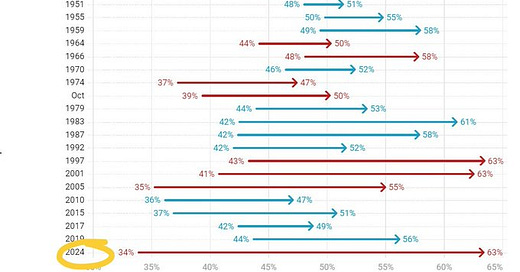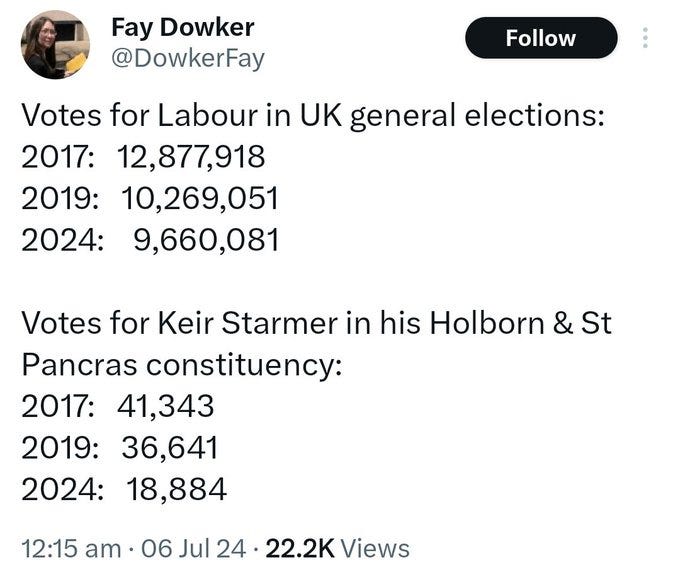Initial thoughts on the UK election results
The real story behind the misleading claims of a 'landslide for Starmer'
There are two countries whose politics I follow relatively closely besides South Africa’s: the UK and the USA. The USA goes to elections in November and the biggest question there is who will replace Biden for the Democrats to have a chance of beating Trump, whose popularity remains remarkably high despite his objectively terrible track record - just as a human being, nevermind a leader.
The modern USA is good at giving the illusion of democracy but the actual options available to citizens and media coverage are tightly constrained and controlled by a rather monstrous elite with a shared stomach but two rather different-looking heads. As the intellectual David Graeber once put it, the strongest marketing line for a party like the Democrats now is, ‘At least we’re not fascist or like Trump’. Since that has direct relevance to the UK, this short (3min) clip from Graeber is worth watching:
The first crucial point is that former Labour Party leader Jeremy Corbyn exposed the fact that the UK, too, is more a performance of democracy than a real one. Whether or not you agree with his political views, the objective evidence shows that Corbyn was systematically smeared by the media (and some public institutions) using entirely false allegations, that almost the entire UK media effectively campaigned against him, and that the military and intelligence establishment publicly stated that he was a ‘national security threat’ and insinuated the possibility of a coup if he became prime minister. He was falsely smeared as an admirer and possible ally of Vladimir Putin, when in fact he had been a critic of Putin long before that was common. All of that for someone who likely would just have implemented a social democratic and anti-war mandate...
Although the viciousness of those tactics were historically unprecedented, Labour under Corbyn still managed to win a sizeable share of the votes (more on that below).
The second is that Corbyn’s successor, Keir Starmer, turned out to be a pathological liar: a charisma-less right-of-centre lawyer who strangely had been hiding in a left-wing Labour cloak for decades. (How that happened is an interesting subject for further investigation). Keir Starmer won the Labour leadership claiming to support the policies that Corbyn’s team had developed - and which had massively increased the number of Labour Party members - and promising unity. As soon as he had power, Starmer purged as many of Corbyn’s supporters as possible, reneged on every policy pillar he had endorsed, and purged many Jews from the Labour Party while in parallel attempting to expel Corbyn from the Labour Party for supposedly ‘downplaying anti-Semitism in the Party’. Here’s an excerpt from one useful compilation produced by DoubleDownNews in the UK:
[Full video here. Another useful video here includes mention of Starmer’s links to networks of power in the United States not just the UK]
The third is that the Conservative Party had run itself into the ground. The Conservatives (‘Tories’) seemed to do everything possible to make themselves more and more extremely right-wing and as unpopular as possible. As bigoted, ignorant and unpleasant as many in the Tory leadership were, I still find the sheer absurdity of some of their conduct implausible. Despite their best efforts with Boris Johnson in charge - a lying, boorish, incompetent, uncaring and generally terrible leader - the opinion polls still did not dramatically shift in Starmer’s favour. It took the removal of Johnson and further sustained effort from a full range of Tory leaders for the popularity of Labour under Starmer to reliably poll above the Tories. It would not surprise me if they were encouraged to go down that path by people who wanted Starmer as a ‘Labour Prime Minister with Conservative policies’: that seems a more plausible explanation than believing that the self-destruction was merely a natural occurrence.
So, coming into the election the situation was that the Conservative Party had made itself as unpopular as it possibly could, the media had presented as rosy a picture of Starmer as they could - despite his lies, dubious history as head of the the country’s prosecutions service and wooden personality - and all of these had done their best to erase Corbyn and the hope he had generated from the public mind. The choice presented to the public was: ‘boring Starmer or deranged Conservatives’.
The intended similarity to the United States is not coincidental - the point I quoted from David Graeber above. However, UK democracy is a little harder to manipulate. Due to Starmer’s purge, many former Labour Party candidates stood as independent candidates or switched to parties like the Greens or Liberal Democrats. The Labour Party under Starmer’s leadership still won and some media referred to it as a ‘landslide’ but is that accurate?
The headline result is that Labour won 412 seats against the Conservatives 121. On the face of it that seems to justify the ‘landslide’ headlines.
Partly because of how the UK election system works, that conceals a very different picture.
Perhaps the single most informative graph I have seen is this one showing the percentage of votes won (on the left-hand side) contrasted with the number of seats won (right-hand side) for the party with the majority. As it shows, the vote-seat gap for Labour in 2024 is the largest in post-World War II UK history.

As important is the fact that the number of votes won by Labour actually declined in absolute terms under Starmer even in his own constituency, as others have pointed out:
:
The collapse in Labour’s vote numbers also provides some evidence to contradict claims, including in polls, that citizens think the Labour Party has improved under Starmer.
Given Starmer’s links to the military and intelligence establishment it is not surprising that he has declared that his first priority, even though with few such serious threats to the UK it is unlikely to be a priority for the citizens of the country.
It should be no surprise that Starmer’s tenure will likely be that of a moderate Conservative on domestic issues and something close to the Republican neoconservatives on foreign policy. Where foreign and domestic policy intersect, he will choose the foreign policy stance. Starmer’s involvement in the Wikileaks trial of Julian Assange shows that. It was another case where Starmer’s involvement was concealed through the destruction of documents (as also happened with the decision not to prosecute paedophile Jimmy Saville).
In short, there is no reason to believe that Starmer’s tenure reflects a ‘left-wing’ political victory in any way: the Starmer project is to rebrand right-wing politics in the UK as left-wing. Similar efforts are under way in many other countries, including France, Germany and indeed South Africa.
More on that in future posts.
[This post was edited after initial publication to include omitted material on Labour’s declining number of votes from Corbyn to Starmer, as well as correct some typographical errors]







